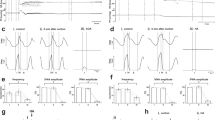Abstract
SLICES of adult rat kidney have been found not to take up oxygen at a constant rate in media which are suitable for other tissues1,2. They were found to do so, however, in a medium containing physiological concentrations of sodium, potassium, calcium, magnesium, phosphate and chloride ions and glucose3. Because its ionic requirements are so critical, this was considered a suitable tissue to use in an investigation of the relative importance of the cations and anions in balanced media. Slices of adult rat kidney were therefore set up in Barcroft manometers under oxygen at 38.5° C. in media having the cation concentrations which had been found to support their steady respiration, but in which chloride was replaced by other anions.
This is a preview of subscription content, access via your institution
Access options
Subscribe to this journal
Receive 51 print issues and online access
$199.00 per year
only $3.90 per issue
Buy this article
- Purchase on Springer Link
- Instant access to full article PDF
Prices may be subject to local taxes which are calculated during checkout
Similar content being viewed by others
References
Laser, H., Biochem. J., 36, 319 (1942).
Cutting, M., and McCance, R. A., J. Physiol., 104, 288 (1946).
Robinson, J. R., Biochem. J., 45, 68 (1949).
Author information
Authors and Affiliations
Rights and permissions
About this article
Cite this article
ROBINSON, J. Effect of Anions on the Respiration of Kidney Slices from Adult Rats. Nature 165, 730–731 (1950). https://doi.org/10.1038/165730b0
Issue Date:
DOI: https://doi.org/10.1038/165730b0
Comments
By submitting a comment you agree to abide by our Terms and Community Guidelines. If you find something abusive or that does not comply with our terms or guidelines please flag it as inappropriate.



